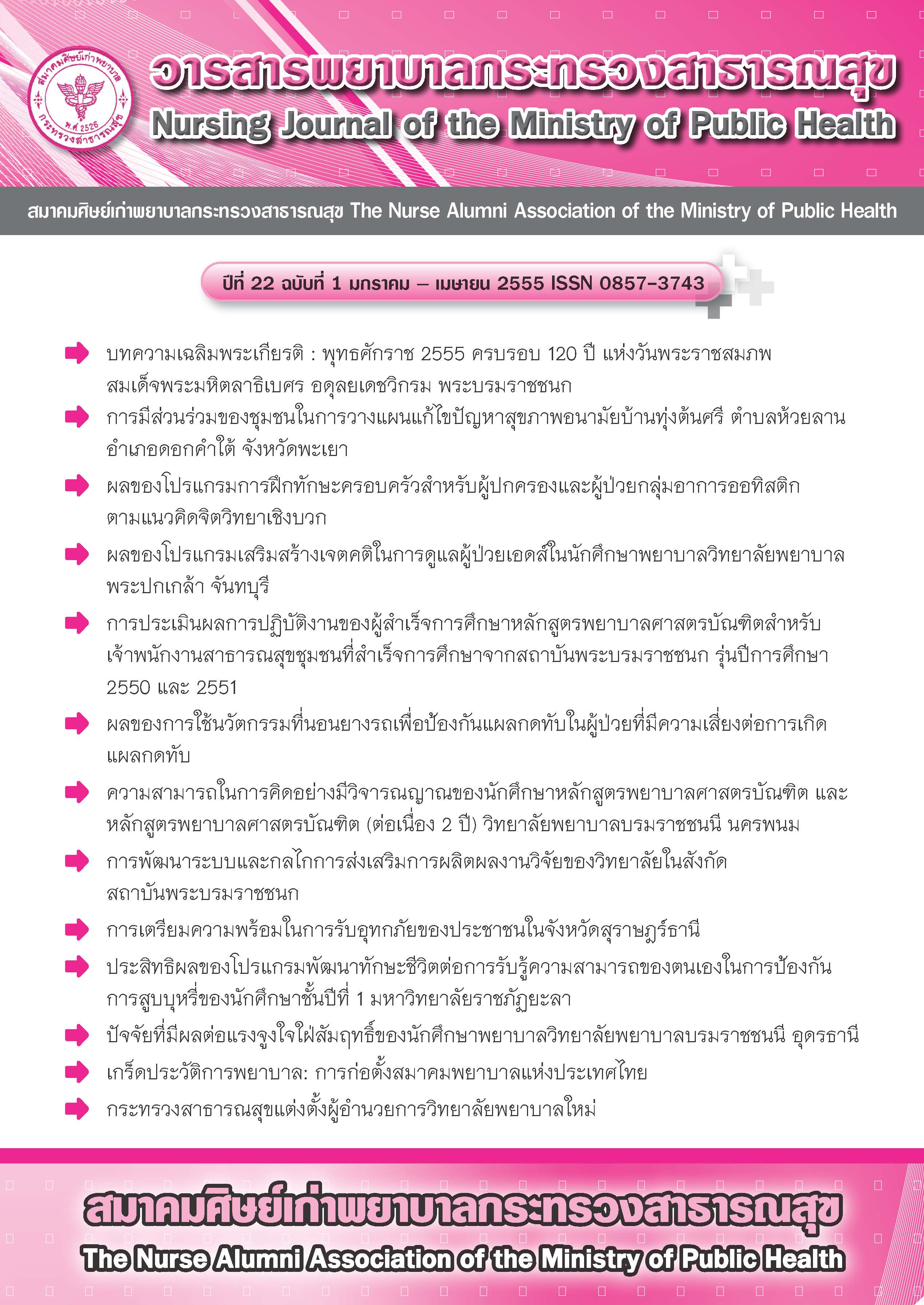ผลของโปรแกรมการฝึกทักษะครอบครัวสำหรับผู้ปกครองและผู้ป่วยกลุ่มอาการออทิสติก ตามแนวคิดจิตวิทยาเชิงบวก
Main Article Content
Abstract
บทคัดย่อ
การศึกษานี้มีวัตถุประสงค์เพื่อศึกษาผลของโปรแกรมการฝึกทักษะครอบครัวสำหรับผู้ปกครองและผู้ป่วยกลุ่มอาการออทิสติกที่มารับการบำบัดรักษาที่โรงพยาบาลยุวประสาทไวทโยปถัมภ์ โปรแกรมการฝึกนี้ได้เน้นการเสริมสร้างความสุขให้กับผู้ปกครองตามแนวคิดของจิตวิทยาเชิงบวก โปรแกรมนี้จะประเมินเกี่ยวกับทักษะการสอนบุตรและความสามารถในการเผชิญปัญหาของผู้ปกครอง กลุ่มตัวอย่าง คือ ผู้ปกครองของผู้ป่วยกลุ่มอาการออทิสติก ประกอบด้วยกลุ่มทดลอง 10 ครอบครัวและกลุ่มควบคุม 10 ครอบครัว ผู้ปกครองเข้าร่วมโปรแกรมการฝึกทักษะครอบครัวสัปดาห์ละ 2 ครั้ง เป็นจำนวน 20 ครั้ง การวิจัยครั้งนี้ใช้รูปแบบการวิจัยแบบผสมผสาน (Mixed method research) เครื่องมือที่ใช้ในการวิจัยครั้งนี้ได้แก่ (1) แบบประเมินความสามารถในการเผชิญปัญหาของผู้ปกครองผู้ป่วยกลุ่มอาการออทิสติก ค่าความเชื่อมั่นของแบบวัดได้เท่ากับ 0.91 (2) แบบประเมินทักษะการฝึกปฏิบัติการส่งเสริมพัฒนาการเด็กออทิสติกสำหรับกลุ่มผู้ปกครองมีส่วนร่วม ค่าความเชื่อมั่นของแบบวัดได้เท่ากับ 0.77 (3) แบบสัมภาษณ์เกี่ยวกับความพึงพอใจต่อโปรแกรมการฝึกทักษะครอบครัวของผู้ป่วยกลุ่มอาการออทิสติกตามแนวคิดจิตวิทยาเชิงบวก และใช้สถิติวิเคราะห์ค่า Mean, Range, S.D., Wilcoxon Signed Rank Test, Mann-Whitney U Test, Content analysis
ผลการวิจัย พบว่า
1) ผู้ปกครองของผู้ป่วยกลุ่มอาการออทิสติกมีทักษะการสอนบุตรมากกว่าก่อนการเข้าร่วมโปรแกรมการฝึกทักษะครอบครัวอย่างมีนัยสำคัญทางสถิติที่ระดับ 0.01
2) ทักษะการสอนของผู้ปกครองผู้ป่วยกลุ่มอาการออทิสติกที่เข้าร่วมโปรแกรมการฝึกทักษะครอบครัวมีทักษะการสอนสูงกว่ากลุ่มควบคุม แต่ไม่มีนัยสำคัญทางสถิติ (p>0.05) และ
3) ผู้ปกครองมีความพึงพอใจสูงกับความสามารถในการเผชิญปัญหา ได้แก่ (1) ด้านการสอนและส่งเสริมพัฒนาการบุตร (2) ด้านการจัดการกับพฤติกรรมที่ไม่พึงประสงค์และการปรับพฤติกรรมของบุตร และ (3) ด้านการเผชิญปัญหาที่มีความสำคัญในชีวิตและในภาพรวม
ผลการศึกษานี้นำไปใช้ในการพัฒนาโปรแกรมการฝึกผู้ปกครองของผู้ป่วยกลุ่มอาการออทิสติกที่มีประสิทธิภาพต่อไป
คำสำคัญ: โปรแกรมการฝึกทักษะครอบครัว, จิตวิทยาเชิงบวก, ครอบครัวและผู้ป่วยกลุ่มอาการออทิสติก
Abstract
The study focused on investigating the efficacy of the “Family Skills Training” program for parents of autistic children who received treatments at Yuwaprasart Waitayoprathum Child Psychiatric Hospital. The program focused on enhancing happiness in the parents based on the Positive Psychology approach. This program measured the parental teaching skills and the parental coping skills. The sample was selected 10 families of experimental group and 10 families from the control group. The experimental group parents participated in the Family Skills Training Program twice a week, totaling 20 times. A mixed methods research design was employed. The tools used for this research were: (1) The Self-Efficacy of Parents of Children with Autism Questionnaire. This questionnaire showed that it had a Cronbach’s alpha coefficient of 0.91, (2) The Parental Involvement in teaching Skills for Child Development Inventory. This instrument had a Cronbach’s alpha coefficients of 0.77, and (3) The satisfaction in Family Skills Training Program based on Positive Psychology Interview Questions. Descriptive statistics and inferential statistics used were Wilcoxon Signed Rank Test, Mann-Whitney U Test, and content analysis.
The results were as followings:
1) Parental teaching skills were higher than their skills before participation, at a significance level of 0.01.
2) Parental teaching skills of the experimental group was not significantly different from the control group (p>0.05).
3) Parents were highly satisfied with coping abilities on 3 aspects: (1) enhancing their child’s development, (2) managing their child’s behavior, and (3) coping with crucial problems in their overall lives.
The findings from this study can be applied to the development of the effective of parental training programs for the parents of children with autism.
Key words : Family Skills Training Program, Positive Psychology, Parents and Children with Autism
Article Details
บทความและรายงานวิจัยในวารสารพยาบาลกระทรวงสาธารณสุข เป็นความคิดเห็นของ ผู้เขียน มิใช่ของคณะผู้จัดทำ และมิใช่ความรับผิดชอบของสมาคมศิษย์เก่าพยาบาลกระทรวงสาธารณสุข ซึ่งสามารถนำไปอ้างอิงได้

